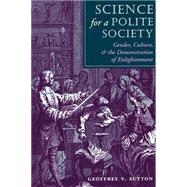Science For A Polite Society: Gender, Culture, And The Demonstration Of Enlightenment
, by Sutton,Geoffrey V.- ISBN: 9780813315768 | 081331576X
- Cover: Nonspecific Binding
- Copyright: 9/5/1997
Traditional accounts of the scientific revolution focus on such thinkers as Copernicus, Galileo, and Newton, and usually portray it as a process of steady, rational progress. There is another side to this story, and its protagonists are more likely to be women than men, dilettante aristocrats than highly educated natural philosophers. The setting is not the laboratory, but rather the literary salons of seventeenth- and eighteenth-century France, and the action takes place sometime between Europe's last great witch hunts and the emergence of the modern world.Science for a Polite Societyis an intriguing reexamination of the social, cultural, and intellectual context of the origins of modern science. The elite of French society accepted science largely because of their personal involvement and fascination with the emerging philosophy of nature. Members of salon society, especially women, were avid readers of works of natural philosophy and active participants in experiments for the edification of their peers. Some of these women went on to champion the new science and played a significant role in securing its acceptance by polite society.As Geoffrey Sutton points out, the sheer entertainment value of startling displays of electricity and chemical explosions would have played an important role in persuading the skeptical. We can only imagine the effects of such drawing-room experiments on an audience that lived in a world illuminated by tallow candles. For many, leaping electrical arcs and window-rattling detonations must have been as convincing as Newton's mathematically elegant description of the motions of the planets.With the acceptance and triumph of the new science came a prestige that made it a model of what rationality should be. The Enlightenment adopted the methods of scientific thought as the model for human progress. To be an "enlightened" thinker meant believing that the application of scientific methods could reform political and economic life, to the lasting benefit of humanity. We live with the ambiguous results of that legacy even today, although in our own century we are perhaps more impressed by the ability of science to frighten, rather than to awe and entertain.







